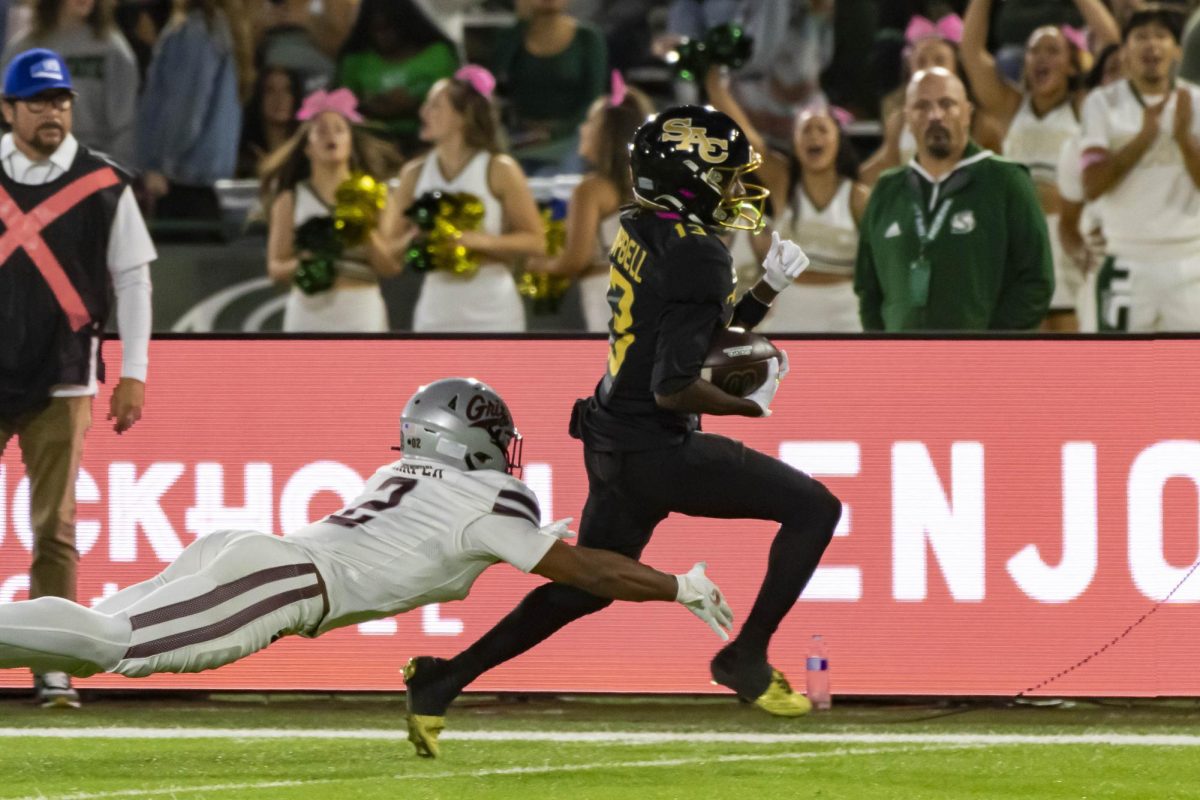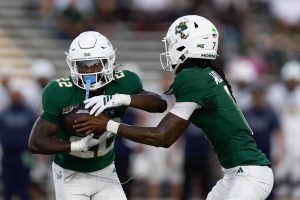NCAA Championships: Day 1 roundup
June 8, 2006
SACRAMENTO, Calif. (AP) – Virginia Powell of USC broke the collegiate 100-meter hurdle record she shared with Gail Devers by running 12.55 seconds into a brisk headwind in the event’s semifinal round Wednesday, the opening day of the NCAA track and field championships.
Meanwhile, the Florida State men and Texas women, pre-meet favorites in the team title races, were shaken by a pair of early setbacks.
Powell warmed up for her record performance earlier in the day by running the opening leg of Southern California’s 400-meter relay team in the semifinals, then cruised through the first round of the hurdles.
She had plenty of motivation and speed left for the semis.
Powell, a senior and the event’s defending champion, had twice tied the record of 12.61 set by Devers for UCLA in 1988. But she intended once and for all to take the mark as her own on Wednesday.
Man, it means a lot, like so much, Powell said. I tied it last year and I hit it again this year, but they would not give me any credit. They wouldn’t even say that I hold it with her sometimes. I was thinking `I need to break it for my name to be on it.’
She will be out to break it again, she said, in Friday’s finals.
That’s the point, Powell said, to run faster and faster.
Powell’s 12.61 and 12.55 are the two fastest times in the world in the event this year.
The Florida State men’s 400-meter relay team was disqualified for making a handoff out of the exchange zone in the semifinal round, and Texas lost a load of potential points when a hamstring injury kept Marshevet Hooker out of the long jump qualifying.
UTEP and LSU loomed as title contenders among the men, while Powell and her Southern California teammates threatened to dethrone the Texas women.
The four-day competition began under sunny skies with temperatures about 90 degrees on the Sacramento State track, site of the 2000 and 2004 Olympic trials.
Florida State ran the second-fastest NCAA relay time this season at 38.90 seconds at the regionals two weeks ago. But the Seminoles were disqualified Wednesday when the second leg runner, Ronald Wright, passed out of the zone to Michael Ray Garvin.
FSU men’s coach Bob Braman said simply the handoff was made too late.
If you look at the history of the NCAAs, particularly this event, there’s always a big-time team that doesn’t make the passes, Braman said. The four fastest runners don’t always win. It’s our turn. … There are 21 events. We’ll be here for the rest of the meet. The van’s not packed.
Braman noted that 39.52 seconds was fast enough to make Friday’s finals and that probably would have been our slowest time all year.
That’s the frustrating thing, he said. If you’re a good team, you can still have a ragged exchange and live to fight another day. But it was too ragged, and you only have to be bad once.
Hooker, the reigning 100-meter champion, led Texas in scoring as the Longhorns won the NCAA outdoor title last year and indoor championship this year. The junior injured her left hamstring in the 100 at the regional meet in Austin May 26.
She already was out of the individual sprints but hoped to compete in the long jump and maybe the 400 relay finals.
It became apparent last night and this morning she would not be able to participate in the long jump, Texas coach Bev Kearney said.
UTEP’s all-international squad had a setback, too, when Dominic Tanui failed to make it past the first round of the men ‘s 800. His teammate Elias Koech did make it to the semis, though.
Florida State sophomore Walter Dix led all qualifiers in the 200 at 20.62 seconds. Kelly Willie of LSU was second-fastest at 20.72, just ahead of Florida freshman Willie Perry’s 20.73.
There were no finals on Wednesday.
Halfway through the decathlon, defending champion Trey Hardee of Texas led with 4,311 points _ off his 4,402 first-day score when he broke the collegiate record at the Texas Relays in April.
Jake Arnold of Arizona was second with 3,973 and Joe Detmer of Wisconsin third at 3,929.
Hardee finished his day with a personal-best 47.51-second 400, just behind Detmer, whose 47.28 was fastest in the field.
Hardee got off to a slow start in the 100, usually his best event. His time of 10.70 was fastest of the competition but off the collegiate 100 decathlon mark of 10.36 he set at the Texas Relays.
I had a bad start, came out of the blocks a little funny and had to press the whole race to make myself think I was running fast instead of just being relaxed, he said, and the headwind didn’t help.
Still, the senior didn’t have to worry about coming from behind on the second day, as he did last year.
I’m not discouraged with where I’m at, he said. I’m in the lead, and that’s what matters.



























































































































